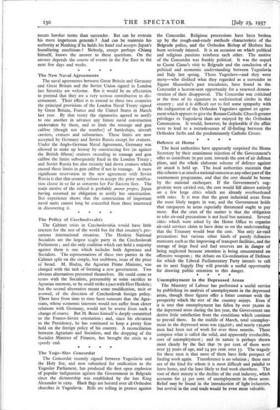The Yugo-Slav Concordat The Concordat recently signed between Yugoslavia and
the Holy See, and now submitted for ratification to the Yugoslav Parliament, has produced the first open explosion of popular indignation against. the Government in Belgrade since the dictatorship was established by the late King Alexander in 1929. Black flags are hoisted over all Orthodox churches in Yugoslavia. Bells are tolling in protest against the Concordat. Religious processions have been broken up by the rough-and-ready methods characteristic of the Belgrade police, and the Orthodox Bishop of Shabatz has been seriously injured. It is an occasion on which political and religious passions reinforce each other. The motive of the Concordat was frankly political. It was the sequel to Count Ciano's visit to Belgrade and the condusion of a political and economic understanding between Yugoslavia and Italy last spring. Those Yugoslays—and they were many—who disliked what they regarded as a surrender to Signor Mussolini's past truculence, have found in the Concordat a heaven-sent opportunity for a renewed demon- stration of their disapproval. The Concordat was criticised at the time of its signature in ecclesiastical circles in this country ; and it is difficult not to feel some sympathy with the indignation of the Orthodox Yugoslays against an agree- ment which appears to give the Roman Catholic Church greater privileges in Yugoslavia than are enjoyed by the Orthodox Communion. It would, however, be deplorable if the affair were to lead to a recrudescence of ill-feeling between the Orthodox Serbs and the predominantly Catholic Croats.






























































 Previous page
Previous page